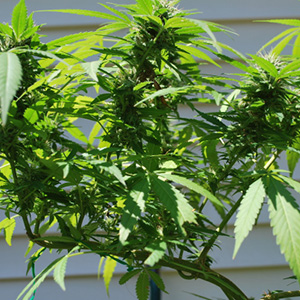In this contributor article, Amy Zukeran of Amy’s Cannabis Garden discusses how cannabis can be used to treat HIV and AIDS-related symptoms and syndromes. This article has been reposted and edited with permission from Amy Zukeran. The original article can be found here.

The following is an article produced by a contributing author. Growers Network does not endorse nor evaluate the claims of our contributors, nor do they influence our editorial process. We thank our contributors for their time and effort so we can continue our exclusive Growers Spotlight service.
Remember the massive AIDS scare? It almost seems like it happened ages ago. When I worked with gay guys in the 80s who were either HIV positive or had full-blown AIDS, it was a death sentence. You don’t know how sad it was hearing a 25-year old coughing with pneumonia from AIDS. Knowing it was a death sentence was terrible. The worrisome thing is that 1 in 8 don’t know they are HIV positive. Worse yet, it could take some people ten years to show any signs of HIV.
First, some definitions:
- HIV, or Human Immunodeficiency Virus, is a virus that spreads through bodily floods, including semen, blood, and milk. HIV targets immune cells, making the body vulnerable to opportunistic infections and leading to AIDS.
- AIDS, or Acquired ImmunoDeficiency Syndrome, is a syndrome characterized by a lack of immune response to infections. These infections, which would normally be harmless to a healthy person, become deadly.
Truth be told, HIV and AIDS have never left us, but have instead become a footnote in the western world because of the spectacular success of antiretroviral cocktails which slow or halt the progression of HIV. They have lowered the mortality rate and extended lives.
However, not everyone has access to STI screening, or antiretroviral meds. By the end of 2015, there were 36.7 million cases of AIDS and HIV worldwide. Since the the Western world first learned about the virus in June of 1981, there have been 35 million deaths worldwide. There are currently 1.2 million people living with AIDS in the U.S., and over 650,000 have died. There are typically 50,000 cases of HIV a year in this country. It is thought that there is about 7 million people worldwide that is HIV positive.
Even if you have access to the antiretroviral drugs, sticking with the drug regimen can be difficult. Common reactions to antiretroviral drugs are nausea, vomiting, and appetite and weight loss. AIDS becomes a wasting disease, instead of a lethal one.
Enter Cannabis.
It is estimated that one in three AIDS patients use cannabis for symptoms such as nausea, appetite loss, pain, and cachexia (weight loss that cannot be reversed by eating more). Many studies have shown the efficacy of cannabis to alleviate nausea, weight loss and appetite loss. It is also useful for treating neuropathic pain (pain originating from the nervous system). Patients who use cannabis along with their AIDS cocktail medications are just as likely to stay with the drug regimen as non-users, but experience fewer symptoms.
HIV Rears Its Ugly Head; Research Fights Back.
HIV infections are on the rise as another generation forgets the lessons of its elders. There are ever-increasing reports of young, gay men finding themselves HIV positive. There is also a rise in heterosexual infections recently, which are typically tied to the rise of HIV in the bisexual population.
In spite of all this, there have been advancements in research for treatment. One 2012 study by Mt. Sinai School of Medicine found that a cannabinoid compound can block the mechanism which allows HIV to enter and infect healthy cells. There is a recent discovery that a compound of cannabis, Denbinobin, was mostly responsible for inhibiting HIV replication. That’s big news for AIDS researchers.
Another possibly important discovery pertains to some cannabis compounds and their interaction with the brain. A study by Temple University researchers found that cannabinoid 2 (CB-2) agonists can stop HIV-Associated Neurocognitive Disorder (HAND), a disorder caused by HIV. Most antiretroviral drugs cannot pass through the blood-brain barrier that protects the brain, but cannabinoids can.
With about 94 percent of Americans supporting the use of medical marijuana for various ailments, research dollars should be pouring in. Sadly, with this uncertain political climate, your guess is as good as mine as to whether there will be a place for cannabis in a physician’s bag. Hope for the best. Aloha.
10 Best Gift Ideas for Cannabis Connoisseurs and Growing Aficionados (2022)
December 7, 2022Developing and Optimizing a Cannabis Cultivation System
December 14, 2021Dealing with Insomnia: How Can CBD Help?
December 10, 2020Your Guide to Sleep and CBD
December 7, 2020
Do you want to receive the next Grower’s Spotlight as soon as it’s available? Sign up below!
Resources:
Want to get in touch with Amy? They can be reached via the following methods:
- Website: http://amys-cannabis-garden.com/

Do you have any questions or comments?

About the Author
Amy was born and raised in the Puna Bud Capital of the World — Hawai’i. She is genetically programmed to write and also explore medical cannabis so visit her blog. Mahalo Nui Loa!